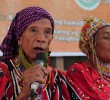PIMENTEL IDENTIFIES MOST DANGEROUS PROVISIONS OF
ANTI-TERROR LAW
MANILA– Senate Minority Leader Aquilino Q. Pimentel, Jr.
(PDP-Laban) today described the Human Security Act of
2007 as a dangerous piece of legislation, as he cited
at least five sections of the law which �may be abused
by the powerful and used as instruments of state
terrorism against the powerless.�
Speaking at the launching of his new book, �The Making
of the Human Security Act of 2007,� at the Philippine
Normal University, Pimentel said he succeeded in
introducing more than a hundred amendments to the
controversial measure to safeguard the people�s
rights.
�Still, it is my humble submission that the law could
be misused or abused by unscrupulous wielders of
powers not to attain its primary objective to protect
the nation from the scourge of terrorism but to
terrorize the people in the guise of extirpating the
crime,� he said.
Of the 62 sections of the HSA (Republic Act 9372),
Pimentel identified the five sections that could
potentially impair the human rights of Filipinos:
1. Surveillance of persons and interception of their
communications (Section 7).
2. Arrest and detention of persons suspected of
terrorist activities without court warrants (section
18 and 19).
3. Examination of bank deposits and financial papers
of suspects (section 27).
4. Seizure, sequestration and freezing of bank
deposits and other assets of the suspects (section
39).
5. Summary arrest of suspects in the country and their
extradition to another country under the so-called
process of �extraordinary rendition.�
The Human Security Act, the country�s version of the
anti-terrorism legislation was signed into law by
President Gloria Macapagal-Arroyo on March 6, 2007 and
will take effect two months after the May 14 national
and local elections.
Pimentel, however, said that the sections he cited are
not self-operating since there are requirements that
should be complied with before law enforcement agents
may use them.
For instance, he said that before law enforcement
agents could place a person under surveillance and tap
his or her communication examine or freeze bank
deposits and financial papers of terror suspects, they
must seek the permission of the Anti-Terror Council
and the justices of the Court of Appeals division that
is assigned by the Supreme Court to handle anti-terror
cases.
If the law enforcers want to arrest and detain a
terror suspect without judicial warrant, Pimentel said
the law requires that the latter must be brought
before the presence of judicial authority nearest the
place where he or she was picked up at any time of the
day or night.
On the seizure, sequestration and freezing of bank
deposits, financial assets and properties of suspects,
Pimentel said this section violates at least three
fundamental rights in the Constitution.
He said these are the right not to be deprived of
property without due process of law, the right to
equal protection of the law and the right to be
presumed innocent until contrary is proved.
Pimentel pointed out that section 17 of the HSA
provides that the properties of suspected terror
organizations may be seized or sequestered only after
a court ruling. But he said there is no such trial
requirement for a suspected individual terrorist whose
assets are being seized.
The HSA prohibits extraordinary rendition of terror
suspects, accused or witnesses to other countries
unless their human rights and the right to counsel are
first assured.
Pimentel said extraordinary rendition is a highly
questionable process whereby a terror suspect may be
seized in one country and sent to another country
where he or she may be tortured to extract evidence of
terror activities.
He emphasized that it behooves all Filipinos who
believe in the rule of law to understand the HSA, know
its pitfalls and share their knowledge as how the
people may protect themselves against abuse by the
powerful.
-o0o-
****** INBOX is an archive of press releases, statements, announcements, letters to the editors, and manifestos sent to Davao Today for publication. Please email your materials to davaotoday@gmail.com. Davao Today reserves the right to edit or refuse material for publication. *****
Terrorism









